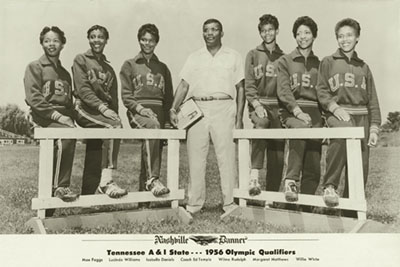
Without much financial assistance from their school, six Tennessee State Tigerbelles qualified for the 1956 Olympics. (l-r) Mae Faggs, Lucinda Williams, Isabelle Daniels, Coach Ed Temple, Wilma Rudolph, Margaret Mathews, and Willie White.
Without the help of legislation to create equality among men and women’s sports, Tennessee State built a winning women’s track program.
By Jason Lewis
Sentinel Sports Editor
jasonl@lasentinel.net
Title IX was not meant to solely bring equality to high school and college sports when it was introduced in 1972, but that is what it has been most known for. Before Title IX there were individual female athletes who excelled, but it was rare to see an entire program win on a high level over a long period of time because schools only invested in male teams.
Those hurdles did not stop Tennessee State from dominating women’s track and field nearly 20 years before Title IX was enacted.
When track coach Edward Temple took over the women’s program in 1950, the budget was only $300 and the facilities were poor. That program, with no financial help to start with, produced 40 Olympians and 34 national titles during Temple’s 44-year career.
Eight Tigerbelles, including Wilma Rudolph, Wyomia Tyus, and Chandra Cheeseborough, were inducted into the National Track and Field Hall of Fame.
Rudolph became an international star when she became the first American woman, of any race, to win three gold medals in track and field during a single Olympic Games when she won gold in the 100 meters, 200 meters, and she was a member of the gold medal winning 4×100 meter relay team, at the 1960 Olympic games in Rome.
Known as “The Tornado,” Rudolph was the fastest woman in the world. She was nicknamed “La Gazzella Nagra” (The Black Gazelle) by the Italians and “La Perle Noire” (The Black Pearl) by the French.
Rudolph was the United Press Athlete of the Year in 1960 and the Associated Press Woman Athlete of the Year in 1960 and 1961.
Right behind Rudolph was Tyus, who won gold medals in the 100-meter dash in the 1964 Olympics in Tokyo, and also in the 100-meter dash and on the 4×100 relay team in the 1968 Olympics in Mexico City.
Tyus was the first woman to retain the 100 meter gold medal when she won it for a second time in 1968.
Tyus went on to coach at Beverly Hills High School and was a founding member of the Women’s Sports Foundation.
Cheeseborough had her greatest fame here in Los Angeles. After missing the 1980 Olympics because of the US boycott of Russia, she won gold medals on the 4×100 and 4×400 teams, and she took a silver medal in the 400-meter dash at the 1984 Olympics.
Cheeseborough would have been a favorite at the 1980 Olympics. That year she took the gold medal in the 100 meter and 4×100 meter relay at the Olympic Boycott Games in Philadelphia. The event was known as the Liberty Bell Classic, where 29 of the boycotting countries of the American-led boycott of the 1980 Olympics participated in events.
Tennessee State was able to produce a lot of these great athletes before the school offered athletic scholarships to the women’s track program in 1967.
Coach Temple notes that one of his greatest accomplishments is that out of the 40 Olympians, 28 of them have master’s degrees and 14 of them have either a M.D. or PhD.
Tennessee State’s program proved that women can compete on the same stage as the men, and they did it without assistance from the government.
Check out the Sentinel Sports Section on Facebook and Twitter.
Sentinel Sports Section Facebook page:
http://www.facebook.com/?ref=logo#!/pages/Los-Angeles-Sentinel-Sports-Section/137328139648009
Sentinel Sports Twitter page:






